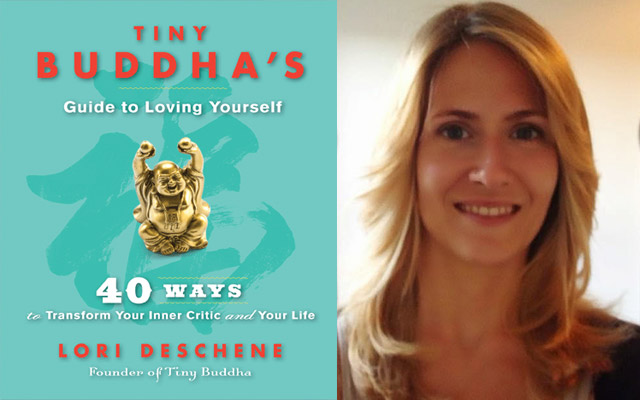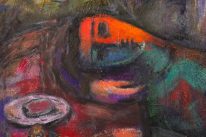
This month we’re celebrating the upcoming launch of Tiny Buddha’s Guide to Loving Yourself, a book about taming your inner critic that features 40 stories from Tiny Buddha contributors.
Throughout September, you’ll have a chance to meet some of them through daily interviews here on the blog.
Today’s featured contributor is life coach Emma Brooke, a yogini with a passion for figuring out how people tick and using that to help them find space and clarity in their lives.
Her contribution for the book focuses on letting go of insecurities.
A little more about Emma…
1. Tell us a little about yourself and your self-love journey.
I picked up yoga when I was 19 in university and finally found a place where there was no competition and no expectations. All the pressure I put on myself and all the expectations of my parents and being the first in the family to go to college fell away, and I finally realized what it meant to relax.
From there, it was years before I had the courage to follow my own path. I’m still walking a tightrope between parental expectations and my own journey, but I’m making great progress.
I trained in counseling and hypnotherapy part-time alongside a full-time job, and now work with other stressed out women to help them stay present and get in touch with their own inner wisdom.
2. Have you ever felt there’s “something wrong with you”? If so, why, and what’s helped you change your perception?
Hasn’t everyone? I often worry that I will always be thinking that the grass is always greener and that I should be like everyone else who accepts that they have to work fifty hours a week for someone else, doing something they aren’t excited about, in order to earn money to live the life they want to live in four weeks a year.
I hope I never convince myself that settling is acceptable. I want to believe I can do good and have fun and make enough money to eat!
3. Have you ever thought something was a flaw only to realize that other people actually appreciate that about you? What was the “flaw”?
I have always been quite analytical and logical, which can come off as unfeeling or emotionally challenged. I spent a long time trying to be more emotional and expressive so people didn’t think I was a heartless cow.
However, I’ve realized that it wasn’t that I couldn’t feel; it was that I was being mindful and accepting of my feelings rather than letting them control me.
This is what I now teach—how to not let your emotions or other people dictate how you feel so you can choose how you feel, and feel your emotions from a safe place. People now pay me to teach them my flaw!
4. What was your biggest mistake (that you’re willing to share), and what helped you forgive yourself?
This is a hard question for me because I really have trained myself to look at everything as a gift or a lesson—living life without regrets!
There are of course life decisions that have affected me in a negative way. I was in an abusive relationship when I was 17, which contributed to an eating disorder I developed in my early twenties.
I also stayed in a relationship with a long-term partner who manipulated me into being someone I neither wanted to be, nor felt comfortable being (and eventually broke up with him—on Christmas).
Despite these mistakes, I don’t regret them. They taught me so many valuable lessons and made me a much stronger person.
5. Complete this sentence: When other people don’t like me, I…
…remember that I’m unique and therefore not for everyone, and that generally the traits you don’t like in other people point to similar traits you want to work on in yourself.
6. What are some areas in your life where you’ve compared yourself to other people, and what’s helped you let go of these comparisons?
I used to spend far too much time and energy comparing myself to other people. Work and school were biggies, fueled by parental expectations.
Through yoga I slowly learned to accept myself for who I was and began to see the value in me, rather than the flaws. This is my journey. It doesn’t matter what course it takes, it will always be mine and for me.
7. What’s one thing you would tell your younger self about looking to other people to complete you?
It can make a great Band-Aid, but that’s all it is. Sometimes it’s necessary to bolster your self-esteem but try to remember that everyone and everything is transitory. You may not always have these people in your life.
8. Have you ever felt afraid to show people your “real” self? Why—and what’s helped you move beyond that?
For a very long while I hid my hypnotherapy and counseling training from work colleagues and friends in case they judged me.
As I’ve got older I have surrounded myself with friends who I can be myself around and who appreciate my uniqueness. Finding “your people” and knowing you’re following your own intuition and are on the right path helps you be your authentic self.
9. What are the top three things you personally need to do to take good of yourself, mentally and emotionally?
- Yoga and meditation. I generally only take 15-20 minutes a day to practice, but it keeps the practice of mindfulness at the forefront of everything I do.
- Fresh air and space. I get claustrophobic in London, even though I live by the river, so I go back to my childhood home in North Wales at least every month.
- My Scottie dog, Sam. He reminds me what it’s like to love unconditionally and have fun for the sake of having fun when he goes mental and runs round in circles for no apparent reason and then curls up in my lap when I need a hug.
10. What’s something you do regularly that makes you feel proud of the difference you’re making in the world?
My work makes me proud. I help people find their intuition and relax and I also volunteer as a compassion for an isolated elderly lady. I might not be changing anything on a global scale, but I get to hear the joy in peoples’ voices and see the smiles on their faces when they feel better, and that’s an incredible feeling.
*Note: I edited this post to remove info about the pre-order promotion, which ended on October 8, 2013. You can learn more about Tiny Buddha’s Guide to Loving Yourself here.
About Lori Deschene
Lori Deschene is the founder of Tiny Buddha. She started the site after struggling with depression, bulimia, c-PTSD, and toxic shame so she could recycle her former pain into something useful and inspire others to do the same. You can find her books, including Tiny Buddha’s Gratitude Journal and Tiny Buddha’s Worry Journal, here and learn more about her eCourse, Recreate Your Life Story, if you’re ready to transform your life and become the person you want to be.
- Web |
- More Posts













 Though I run this site, it is not mine. It's ours. It's not about me. It's about us. Your stories and your wisdom are just as meaningful as mine.
Though I run this site, it is not mine. It's ours. It's not about me. It's about us. Your stories and your wisdom are just as meaningful as mine. 